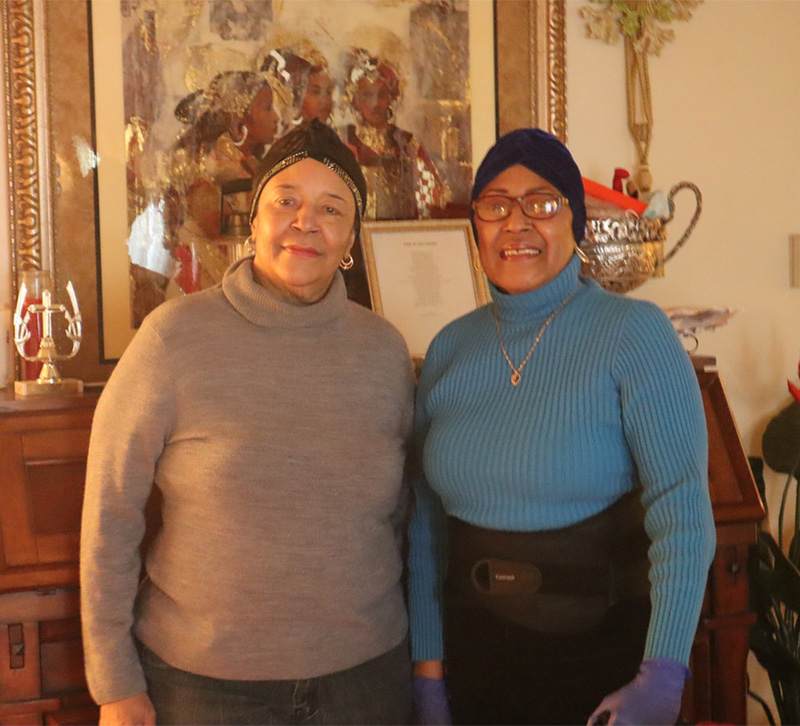Solar / Energy Efficiency Improvement Stories
Suzanne Simmmons
Tricked Into a $50,000 Loan: Suzanne’s Fight to Fix a Flooded Home
Suzanne Simmons, a homeowner in South Los Angeles, was approached by a man claiming to work with the state to fix water quality issues. He colored her tap water to make a point, then entered her kitchen and began making changes on the spot. The result: flooding.
As she scrambled to get the mess fixed, more problems emerged—shower repairs, a malfunctioning toilet, a misinstalled water heater with a broken door, and a smaller replacement unit left behind in her yard. Though various subcontractors came and went, nothing was fully resolved.
Suzanne never knowingly signed up for any financing, but she later discovered a $50,240 loan opened in her name with GoodLeap at a 6.99% fixed rate. Despite getting a refund from one contractor, she continued receiving legal threats from GoodLeap while her bathroom remained unfinished.
She eventually got help from legal aid, but some repairs remain undone. Her showerhead doesn’t work. The tub faucet doesn’t either. Her story is one of deception, damage, and near-disaster—averted only by persistence and outside support.
Ben and Joy Ikeda
Eight Lenders, No Completed Work: The Ikedas’ $664,000 Construction Catastrophe
Ben and Joy Ikeda, senior homeowners in Baldwin Park were planning to convert their garage into an ADU. After pandemic delays, they were approached by William Brothers Building & Construction with an offer to take over the project—and add even more improvements.
At the company’s office in Encino, they were told loans would be taken out in their names, but repayment wouldn’t start until everything was complete. The contractor also promised tenants and refinancing options that would cover the loan.
Instead, Ben and Joy were signed up for multiple loans totaling over $664,000. The ADU was never finished. The junior ADU was never started. The contractor eventually abandoned the job.
They now owe money to eight different lenders, including Mosaic, GoodLeap, GreenSky, Ally Lending, and others. Only one lender has canceled their loan. The rest are active—and threatening. Ben is being sued by a debt collector. Their credit is ruined, and their home is at risk.
The Ikedas’ story is a devastating example of how bad actors can exploit trust, leaving families buried in debt for improvements that never happened.
Denise K. Smith
From Solar Promise to Financial Nightmare: One LA Senior’s Fight to Fix What Went Wrong
Denise Smith, a retired homeowner in Los Angeles, wanted to lower her energy bills by going solar. After investing in a new roof to support the panels, she contacted Vizient for installation, only to be redirected to Sunrun. Financing came through Mosaic, which promised a 30% tax credit that could be applied to her loan. But the credit only applied to her federal taxes—not as a lump sum as she expected—and her monthly payments began climbing without explanation.
Things got worse. A subcontractor from Florida drew faulty installation plans, placing two $10,000 backup batteries in violation of fire codes. Five failed inspections followed. Despite this, Freedom Forever moved ahead with the installation, which led to roof leaks and water damage in Denise’s dining room.
She was forced to coordinate repairs herself and deal with city inspectors—at her own expense. When she asked the company to relocate the batteries, they demanded $52,000. Now on a fixed retirement income, Denise is left paying for a solar system that doesn’t work and a roof that was damaged in the process.
What started as a plan to save money ended in mounting debt, unreturned calls, and a sense of betrayal.
Wayne Bryant
Over $300,000 in Loans, No Finished Work: How Wayne from Inglewood Was Left Holding the Bag
Wayne Bryant, a disabled senior in Inglewood, lives on a fixed income made up of Social Security and veterans disability payments. In 2022, a construction salesperson from William Brothers Building & Construction (“WBBC”) came to his door offering home repairs and an accessory dwelling unit (ADU). They promised to secure financing and even claimed Wayne wouldn’t have to make loan payments until the work was done. After completion, they said, they’d help him find a tenant to cover the rest.
What happened next was a cascade of deception. The salesperson applied for roughly 17 loans and enrolled Wayne in 8 of them—without disclosing the total amounts, interest rates, or monthly payments. The work never passed inspection and, in many cases, never even began. Yet WBBC pressured Wayne to sign certificates stating the projects were complete, falsely telling him it was necessary for them to receive funding to begin the work.
Wayne later discovered he had been saddled with over $300,000 in loan obligations, some stretching 10 to 25 years. When he asked the lenders to cancel the loans, they deflected responsibility back to the contractor. WBBC apologized, promised to continue making payments and to finish the job—but followed through on none of it.
The project remains unfinished. Four of the eight loans are still active. Some have gone to collections. Despite receiving no meaningful benefit, Wayne made payments out of fear—further straining his already limited income. His complaints to the Contractors State License Board revealed that WBBC had been cited before.
Wayne’s experience reflects a larger, systemic problem: vulnerable homeowners being misled into taking on massive debt for projects that are never completed. Instead of getting the improvements he was promised, Wayne was left with mounting stress, financial damage, and no one willing to take responsibility.
PACE Stories
Ricardo and Clemencia Dominguez
“She was under a lot of stress, which led to some medical conditions. … Unfortunately since I have military responsibilities… my mother had to deal with it alone for months”

Ricardo Dominguez, who is active duty with the United States Navy, and his mother Clemencia Dominguez, a monolingual Spanish speaker, wanted to add an income-generating additional dwelling unit to the South Los Angeles home that they have owned since 2013. Despite the fact that Renovate America (HERO) claims not to finance additional dwelling units, Renovate released over $50,000 to a contractor that never completed the funded work. The Dominguez’s annual property taxes increased by 70% – far more than the family could afford. The stress of the financial pressure was so great that it negatively impacted Ms. Dominguez’s health. “She was under a lot of stress, which led to some medical conditions. … Unfortunately since I have military responsibilities … my mother had to deal with it alone for months,” explains Ricardo.
Adolfo Perez Espinoza
“We didn’t know whether we should buy groceries or pay the debt”

Despite already having two window air conditioners and a swamp cooler, Mr. Perez Ezpinoza and his wife, neither of whom speak English, were persuaded to purchase a central air conditioner by a Spanish-speaking salesman, who dropped by their home in the Central Valley. They were told the unit would be more efficient and less expensive, costing only $100 a month after an initial payment of $2,500. Instead, without their knowledge, an English-speaking employee who later visited them arranged a financing agreement with Renovate America and the Western Riverside Council of Governments for $18,749, or $35,617 over the term of the loan. Not only did the installation damage their home, but the home’s energy bills actually increased by 30%, and nearly 100% during hot and cold months. Their mortgage increased by $400 a month, far more than Mr. Perez Espinoza and his disabled wife could afford. They have been in risk of foreclosure ever since. She says, “[we] planned to retire here, but with the AC installation [and debt], it feels like we have a long way ahead before being able to enjoy [retirement]. They forced us into this debt.” Before Mr. Perez Espinoza added more hours, now regularly working 12 hour days, he says, “we didn’t know whether we should buy groceries or pay the debt. This was so frustrating for us.”
Rosie Bailey
“My property taxes tripled and I’ve been behind ever since… and now I’m suffering”

Rosie Bailey was approached by a PACE salesperson at her home during the holidays and told that she qualified for a local city program offering low-income residents “green” upgrades. She was sold several products, including a walk-in tub for her disabled son, which ultimately did not pass inspection and had to be removed. Rosie was only ever told that her property taxes would decrease; instead her property taxes tripled, to over $11,000 a year. “My property taxes tripled and I’ve been behind ever since… and now I’m suffering. … [PACE] caused a tremendous financial hardship for my family.” “This [PACE Administrator] is a company that’s taken advantage of underprivileged people. … I think they’ve taken advantage of homeowners that really don’t know or understand their program.”
Christopher Younger
“The worst experience I have ever had owning a home”

In December 2016, Renovate America (HERO) recorded a lien against Christopher Younger’s South LA home for about $52,000. Only about a third of the work he requested was installed properly, but the bigger issue was that Mr. Younger had been told that he would not have to pay for improvements while he owned the home. He was told that the loan would be repaid when he sold his house, with no effect on his property taxes or mortgage. In actuality his mortgage jumped from about $1700 to $2500, an increase of approximately 50%. Mr. Younger fell into foreclosure status and his home was slated to be auctioned in February 2019. By taking on a massive burden of debt, he was able to avoid foreclosure and is now making it “by the skin of [his] teeth.” Mr. Younger describes his PACE financing as “the worst experience I have ever had owning a home. It has been gut wrenching.”
Alma Marquez
“The strain on me and my family has been enormous – I now can’t sleep and suffer from anxiety attacks”

Alma Marquez is saddled with a $70,000 loan for work that was never completed. She wanted to upgrade her garage to a rental unit, but after the PACE administrator paid the contractor without inspecting that the work was complete, the contractor abandoned the project. Ms. Marquez imagined bringing in rental income and securing her financial future. “Now my mortgage has almost doubled to $3,200 per month – the only reason I am still in my home is due to Covid-related mortgage forbearance. The strain on me and my family has been enormous – I now can’t sleep and suffer from anxiety attacks. I need someone to help me.”
Alma Foster
“This was supposed to be our golden years living out the rest of our lives here in this house, and it’s more like brass years”

In October 2015, Renovate America (HERO) recorded an $83,000 lien against Alma Foster’s home she shares with her sister in South LA. Without telling the Fosters how much the PACE assessment was for or explaining how it works, the PACE representative enrolled Ms. Foster into the program through an electronic Docusign contract and a made-up email. Ms. Foster and her sister are on a fixed income, and any reasonable person could have seen the Fosters would not be able to afford to pay off this expensive assessment. Besides signing up the Fosters for home repairs they could not afford, the contractors did subpar work that was never fully completed. Now, the Fosters are left with more home repairs than before and are at imminent threat of foreclosure. As Ms. Foster so aptly put it, “this was supposed to be our golden years living out the rest of our lives here in this house, and it’s more like brass years than golden.”
